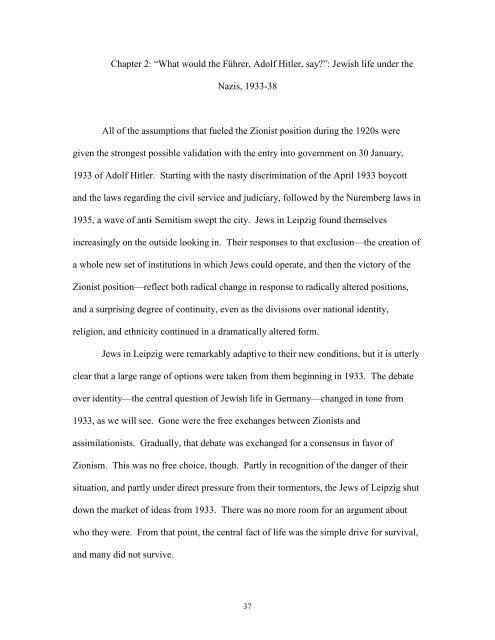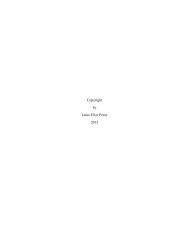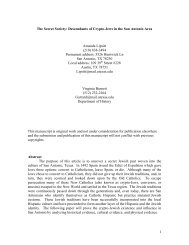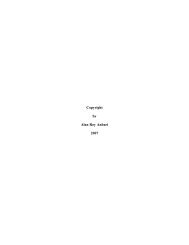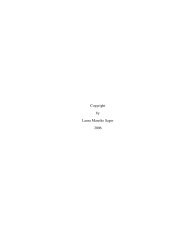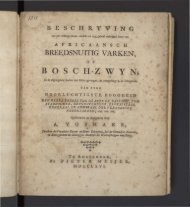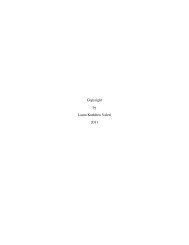Jews in Leipzig - The University of Texas at Austin
Jews in Leipzig - The University of Texas at Austin
Jews in Leipzig - The University of Texas at Austin
You also want an ePaper? Increase the reach of your titles
YUMPU automatically turns print PDFs into web optimized ePapers that Google loves.
Chapter 2: “Wh<strong>at</strong> would the Führer, Adolf Hitler, say?”: Jewish life under the<br />
Nazis, 1933-38<br />
All <strong>of</strong> the assumptions th<strong>at</strong> fueled the Zionist position dur<strong>in</strong>g the 1920s were<br />
given the strongest possible valid<strong>at</strong>ion with the entry <strong>in</strong>to government on 30 January,<br />
1933 <strong>of</strong> Adolf Hitler. Start<strong>in</strong>g with the nasty discrim<strong>in</strong><strong>at</strong>ion <strong>of</strong> the April 1933 boycott<br />
and the laws regard<strong>in</strong>g the civil service and judiciary, followed by the Nuremberg laws <strong>in</strong><br />
1935, a wave <strong>of</strong> anti- Semitism swept the city. <strong>Jews</strong> <strong>in</strong> <strong>Leipzig</strong> found themselves<br />
<strong>in</strong>creas<strong>in</strong>gly on the outside look<strong>in</strong>g <strong>in</strong>. <strong>The</strong>ir responses to th<strong>at</strong> exclusion—the cre<strong>at</strong>ion <strong>of</strong><br />
a whole new set <strong>of</strong> <strong>in</strong>stitutions <strong>in</strong> which <strong>Jews</strong> could oper<strong>at</strong>e, and then the victory <strong>of</strong> the<br />
Zionist position—reflect both radical change <strong>in</strong> response to radically altered positions,<br />
and a surpris<strong>in</strong>g degree <strong>of</strong> cont<strong>in</strong>uity, even as the divisions over n<strong>at</strong>ional identity,<br />
religion, and ethnicity cont<strong>in</strong>ued <strong>in</strong> a dram<strong>at</strong>ically altered form.<br />
<strong>Jews</strong> <strong>in</strong> <strong>Leipzig</strong> were remarkably adaptive to their new conditions, but it is utterly<br />
clear th<strong>at</strong> a large range <strong>of</strong> options were taken from them beg<strong>in</strong>n<strong>in</strong>g <strong>in</strong> 1933. <strong>The</strong> deb<strong>at</strong>e<br />
over identity—the central question <strong>of</strong> Jewish life <strong>in</strong> Germany—changed <strong>in</strong> tone from<br />
1933, as we will see. Gone were the free exchanges between Zionists and<br />
assimil<strong>at</strong>ionists. Gradually, th<strong>at</strong> deb<strong>at</strong>e was exchanged for a consensus <strong>in</strong> favor <strong>of</strong><br />
Zionism. This was no free choice, though. Partly <strong>in</strong> recognition <strong>of</strong> the danger <strong>of</strong> their<br />
situ<strong>at</strong>ion, and partly under direct pressure from their tormentors, the <strong>Jews</strong> <strong>of</strong> <strong>Leipzig</strong> shut<br />
down the market <strong>of</strong> ideas from 1933. <strong>The</strong>re was no more room for an argument about<br />
who they were. From th<strong>at</strong> po<strong>in</strong>t, the central fact <strong>of</strong> life was the simple drive for survival,<br />
and many did not survive.<br />
37


